Artificial Intelligence (AI)
International landscape
- In the academic year 2022-23, the offer of AI master’s programmes is led by the US, with the EU showing improvement over time but lagging behind in all considered years.
- The trend of specialised master’s offer of the EU, the US and the UK are very similar and positive showing an increase in the number of specialised master’s programmes in the academic year 2022-23.
- In specialised master's programmes the EU leads, increasing the gap with the US and the UK.
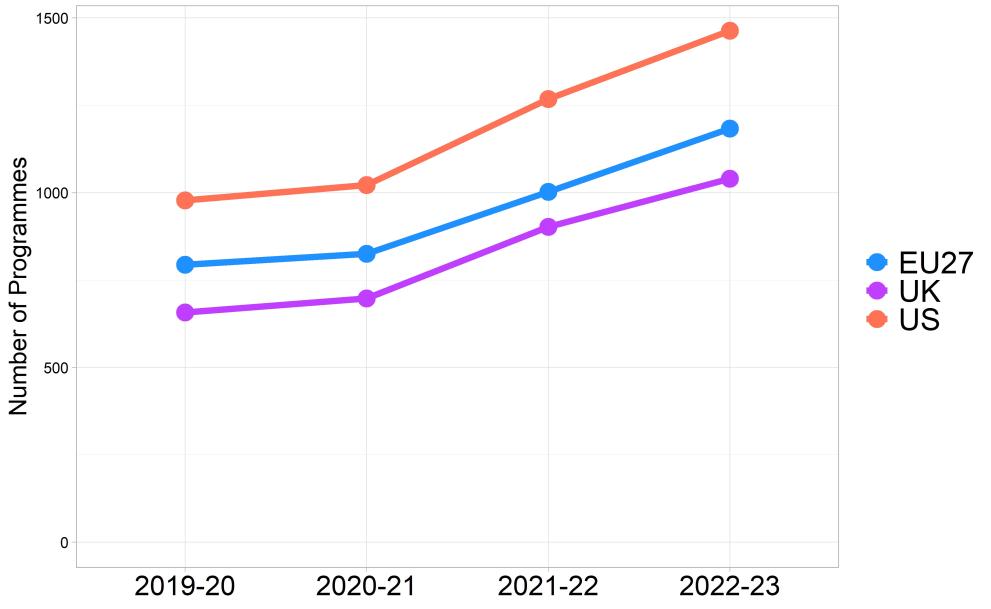
Academic offer related to AI master's degrees
Content areas
- In the main considered geographical areas (EU, UK, US) “Machine learning” is the most frequent content taught.
- “AI applications” is in the second position overtaking “Robotics & Automation” with respect to the previous academic year.
- “AI ethics” remains stable in the fourth position as in 2021-22.
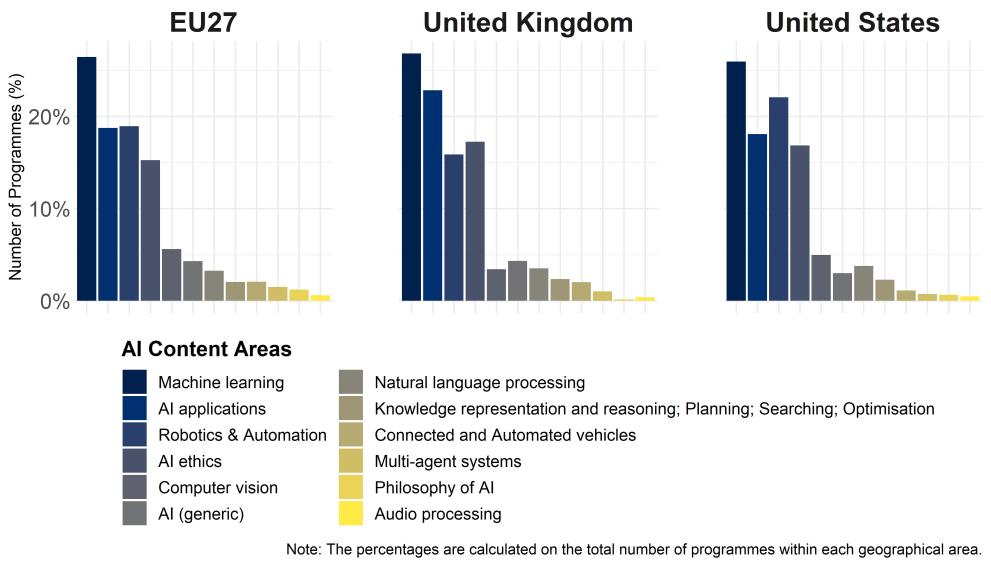
AI-related master's degrees by geographic area and content area, 2022-23
Fields of education
- “ICT” is the main field of education in which AI content is taught, followed by “Engineering” studies and “Business, administration and law” studies.
- No remarkable changes with respect to 2021-22.
Content areas and Fields of education in the EU
- Among the 27 EU Member States, the “ICT” field of education presents an increase of the content related to “Machine learning”, the prevailing content area, compared to 2021-22.
- The content related to “Robotics & automation” leads in the field of education “Engineering, manufacturing and construction”.
- The field of education “Business, administration and law” is mainly focused on “AI applications” and “Machine learning”.
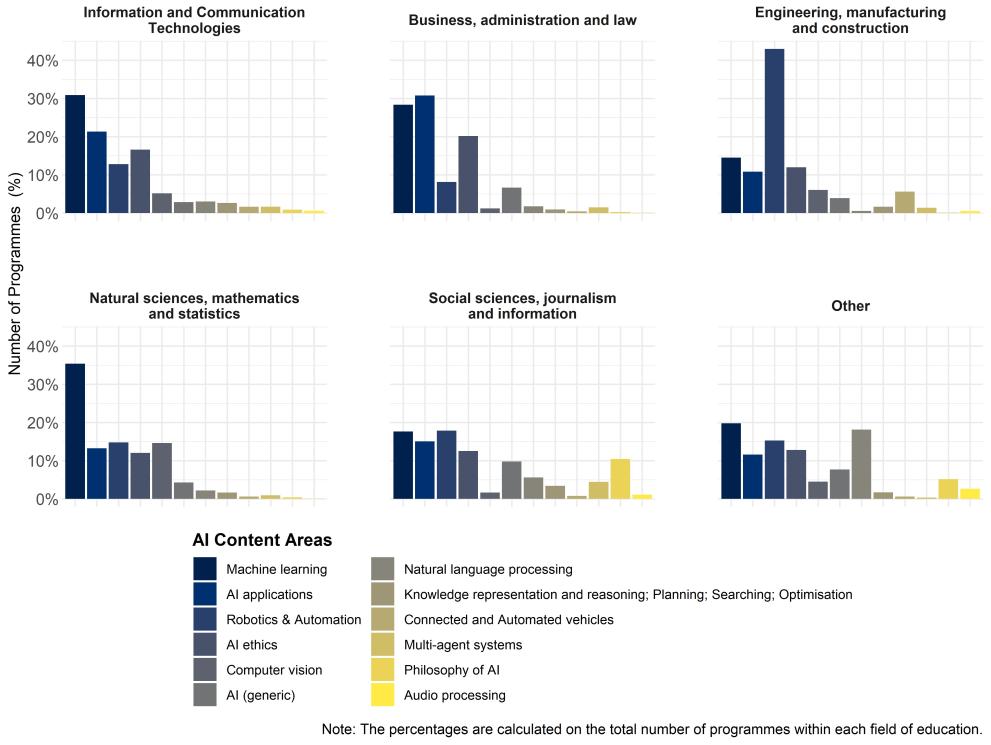
AI-related master's degrees in the EU by field of education and content area, 2022-23
High Performance Computing (HPC)
International landscape
- The academic offer of HPC is led by the US, with the EU showing improvements and overtaking the UK since the academic year 2020-21.
- The offer of specialised HPC master’s programmes has significantly increased in 2022-23.
- The specialised master’s programmes offer of the EU is higher than the one of the UK, but lower than the one of the US in any considered year. Nevertheless, the distance from the US decreased significantly in the last academic year.
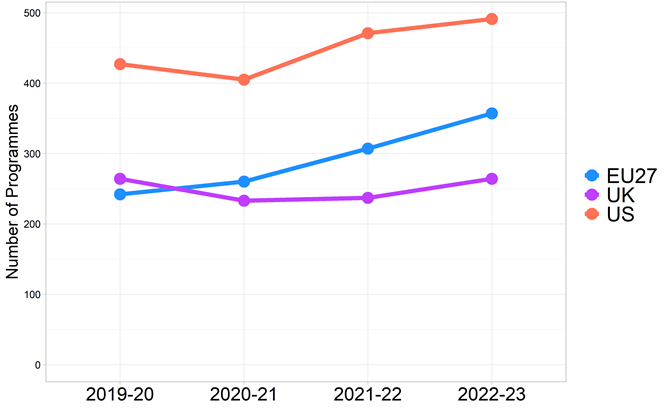
Academic offer related to HPC master's degrees
Content areas
- The EU offer is almost equally focused in the content areas of “Cloud”, “Parallel computing” and “System architecture”.
- The US presents a distribution by content areas very similar to the one of the EU, with a lower share of “Cloud” and a larger share of “HPC (generic)”.
- The UK presents a remarkable focus in “Cloud” content.
- No remarkable changes with respect to 2021-22, except for a slight decrease of the “Cloud” content in the EU.
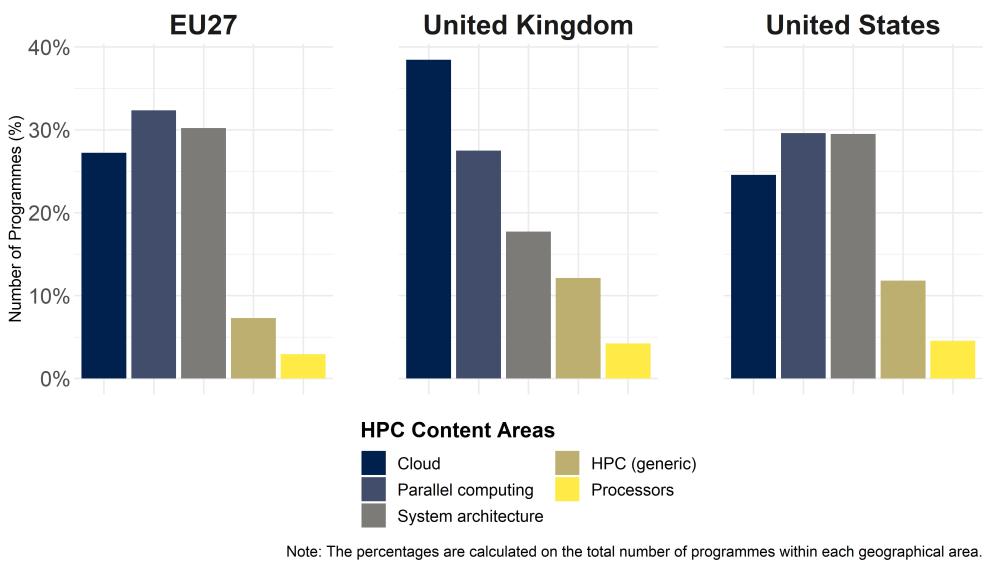
HPC Academic offer by geographic area and content area. EU27, UK, US. 2022-23
Fields of education
- “ICT” remains by far the main field of education in which HPC content is taught, followed by “Engineering” studies (in broad master’s programmes) and by “Business, administration and law” studies (in specialised master’s programmes) while other fields have very low shares.
- The EU academic offer of HPC broad master’s programmes is more limited than the one of the US, but larger than the one of the UK.
Content Areas and Fields of education in the EU
- In the EU, the field of education “ICT” presents a balanced distribution of contents related to “Parallel computing”, “Cloud” and “System architecture”.
- The content area related to “Cloud” is leading in the field of education “Business, administration and law”, but with a lower share compared to the previous academic year (2021-22).
- In the field of education “Engineering, manufacturing and construction”, there is a strong focus in the content areas of “System architecture” and “Parallel computing”, with the latter presenting a larger share than in the previous academic year (2021-22).
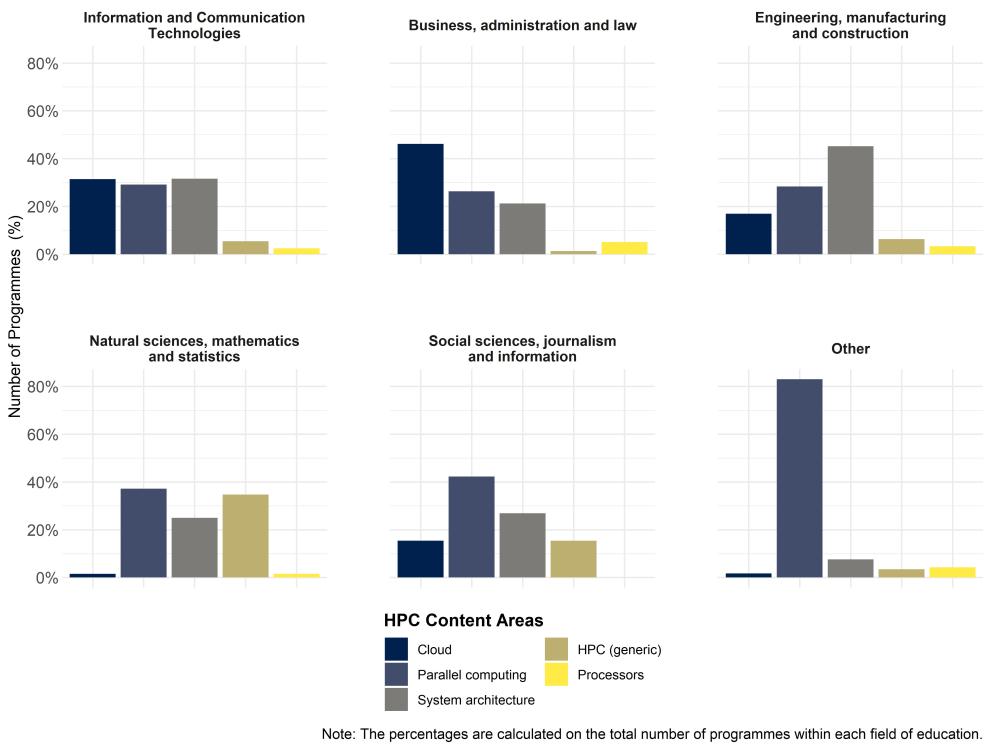
HPC Academic offer by field of education and content areas. EU27. 2022-23
Cybersecurity (CS)
International landscape
- In the academic year 2022-23, the offer of CS is led by the US, followed by the UK, with the EU lagging behind. In addition, the offer of the US appears to have remarkably increased in the last year.
- Regarding specialised master’s programmes, the offer of the EU is consistent over time, with a modest positive trend, but also lags behind both the US and the UK.
- The gap between the US and the EU and the UK in the academic offer of specialised master’s programmes has remarkably increased in the last two academic years.
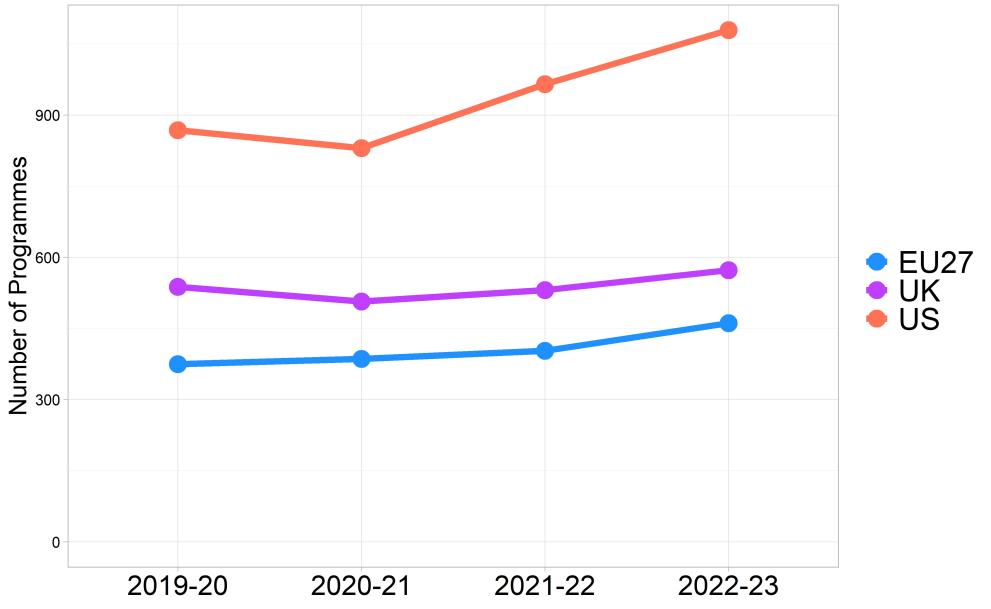
Academic offer related to CS master's degrees
Content areas
- In 2022-23, the EU principal area of content is “Network & Distributed Systems Security”, while the US and the UK’s offers are mainly focused on “Data Security and Privacy", with no changes with respect to 2021-22.
- For the EU, the share of “Cryptology (Cryptography and Cryptanalysis)” is considerable (around 18%), especially if compared to those of the US (8%) and the UK (5%).
- The US shows a remarkable increase in “Cybersecurity (generic)” content with respect to the academic year 2021-22.
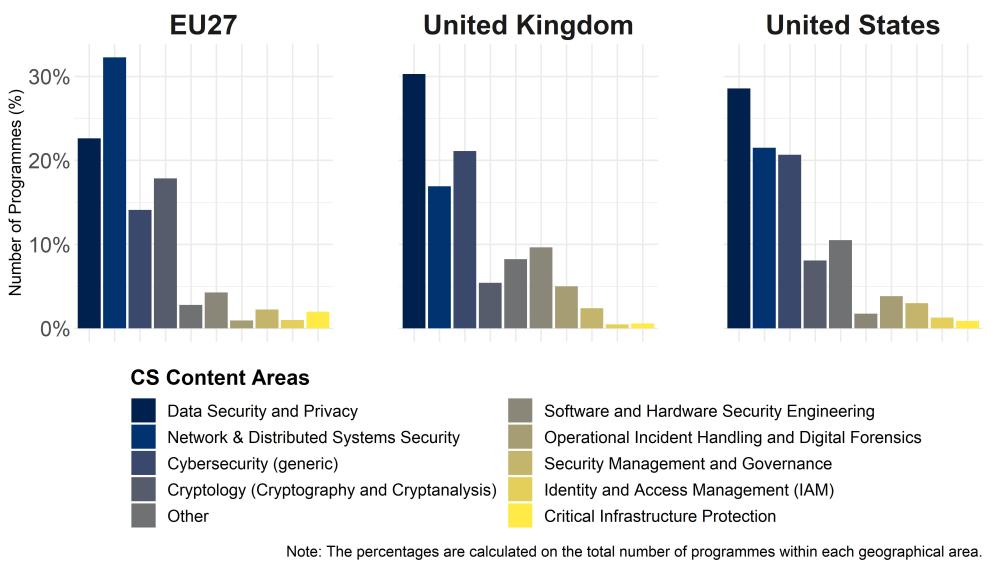
CS Academic offer by geographic area and content area. EU27, UK, US. 2022-23
Fields of education
- “ICT” is undoubtedly the main field of education in which CS content is taught.
- Regarding specialised master’s programmes, the offer is even more concentrated in the ICT field (70% of programmes are taught in ICT studies).
Content areas and Fields of education in the EU27
- In the EU, the field of education “ICT” is mainly focused in the content area of “Network & Distributed Systems Security”, with a respectable share related to “Data Security and Privacy” as well.
- “Cybersecurity (generic)” is the main content taught in the “Business, administration and law” field of education.
- In the EU, the field of education “Engineering, manufacturing and construction” is very focused on the content area regarding “Network & Distributed Systems Security”.
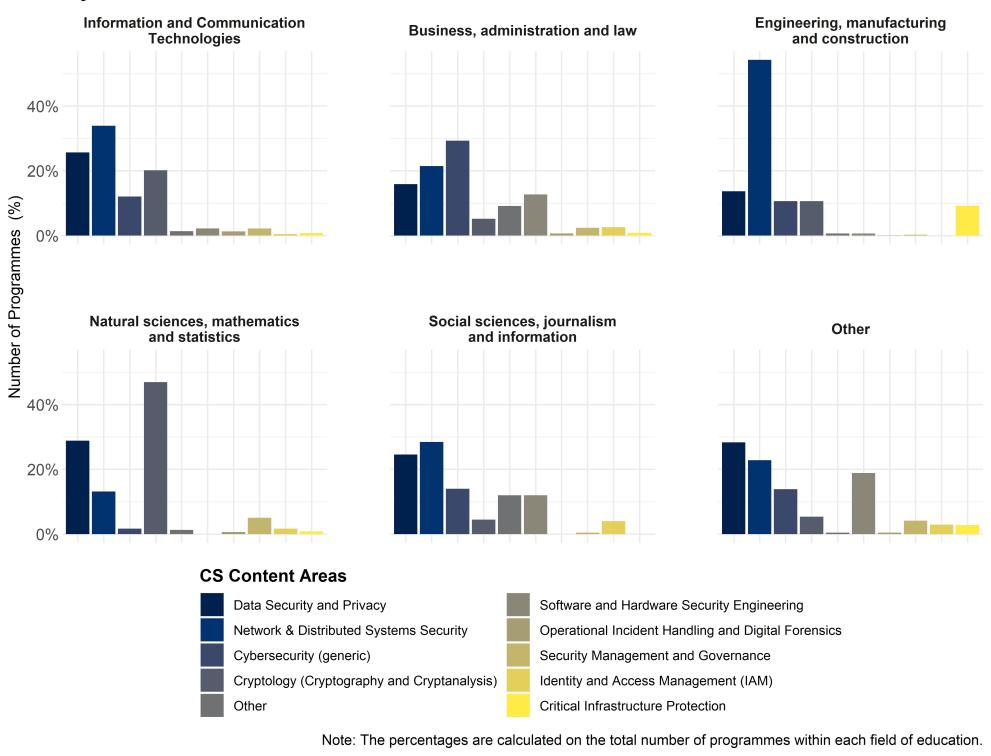
CS Academic offer by field of education and content areas. EU27. 2022-23
Data Science (DS)
International landscape
- In 2022-23, the academic offer of DS is led by the US (which also presents a considerable increase over time), with the EU showing an offer which is very similar to the one of the UK.
- The specialised master’s offer of the EU and the UK are very similar and present similar trends (i.e. 13% increase in the last year) but the one of the US is larger in any considered year.

Academic offer related to DS master's degrees
Content areas
- “Machine learning & Statistical modelling” appears as the main content area taught in DS.
- Compared to last year, in the US the share of “Data analytics (generic)” has slightly increased.
- The content area “Big Data” has a modest share in the US (around 15%), while in the UK and the EU it is much larger (around 25% and 22%, respectively).
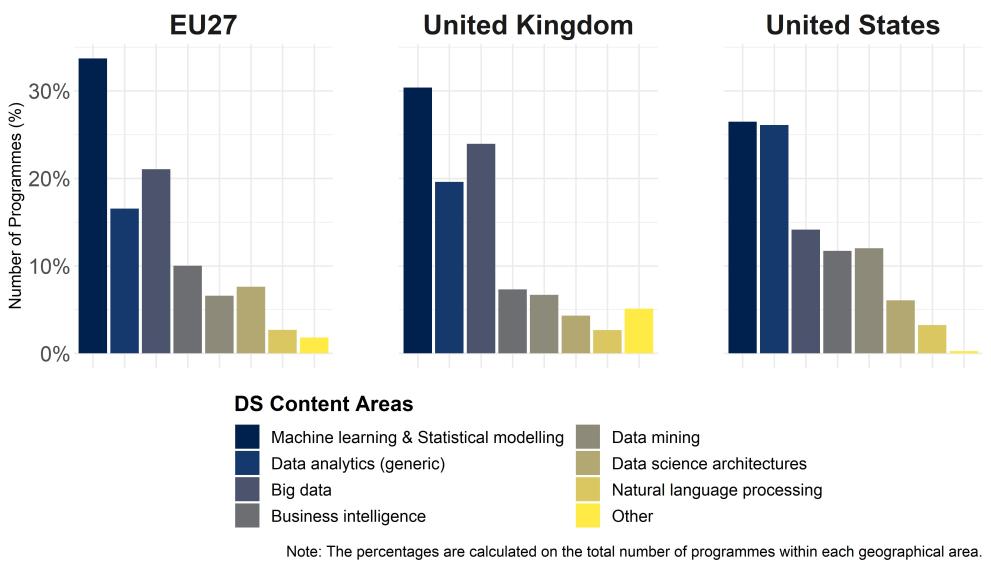
DS Academic offer by geographic area and content area. EU27, UK, US. 2022-23
Fields of education
- “ICT” is undoubtedly the main field of education concerning DS specialised master’s.
- DS broad master’s programmes are primarily taught in the field of education of “Business, administration and law”, closely followed by “ICT”.
- The US presents a remarkable offer of DS specialised master’s programmes in the field of education “Business, administration and law”.
Content areas and Fields of education in the EU
- In the EU, the content area “Machine learning & statistical modelling” holds the largest share (around 45%) in the fields of education “ICT” and “Engineering, manufacturing and construction”.
- The field of education “Business, administration and law” presents a main focus in four content areas, with the one concerning “Big data” in the first position, closely followed by “Data analytics (generic)”.
- The education field “Engineering, manufacturing and construction” is very concentrated in “Machine learning & statistical modelling”.
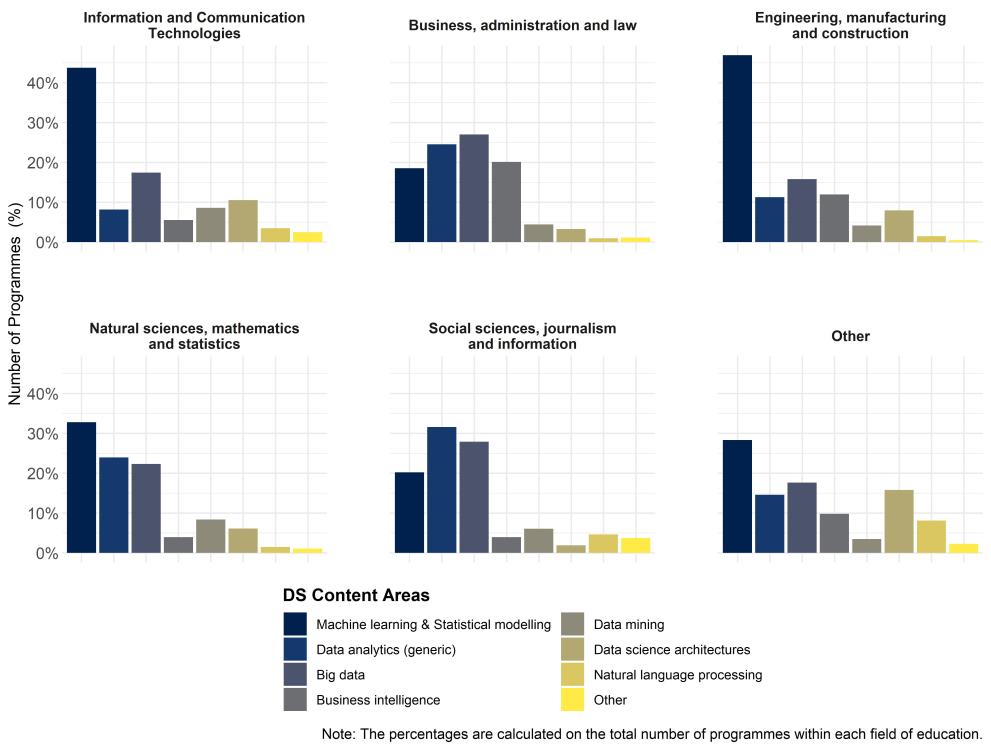
DS Academic offer by field of education and content areas. EU27. 2022-23
Overlaps in the Offer of Digital Domains
- As in last academic year (2021-22), in 2022-23 AI and DS present a considerable intersection in terms of education offer. The size of this intersection (38.3% of the whole education offer in the four domains under study) does not vary with respect to 2021-22 (38%).
- The US clearly leads the education offer of advanced digital technologies (considering the 4 domains: AI, HPC, CS, DS).
- The EU lags behind the US, with an offer that is similar to that of the UK.
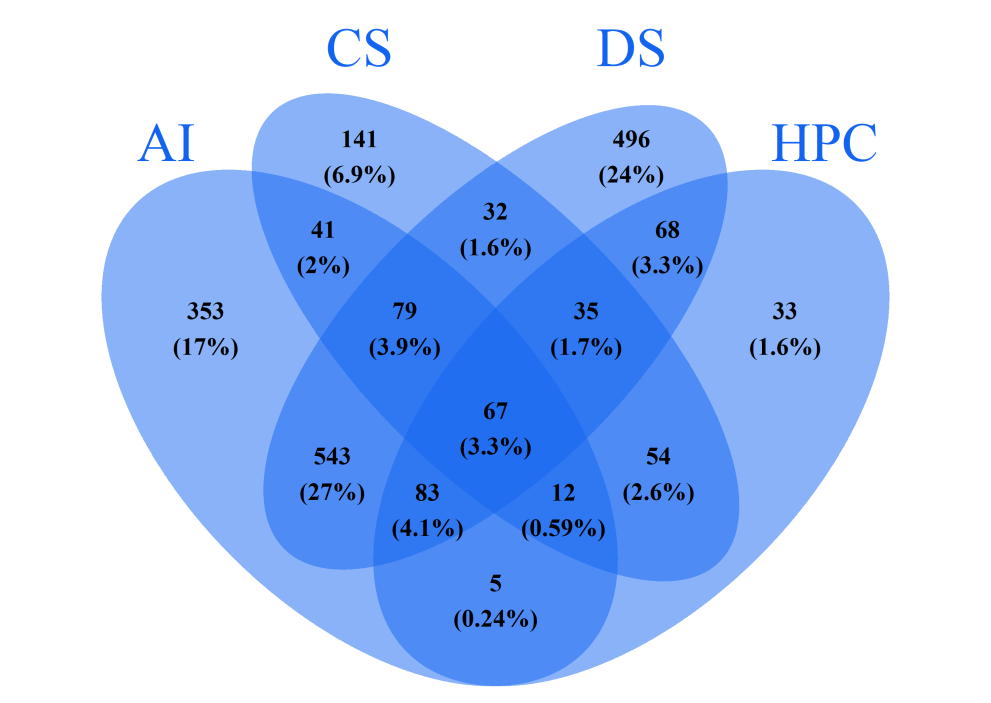
Number of programmes by digital domain. EU27. 2022-23
